How to Become a Teaching Assistant
Looking to become a teaching assistant? We’re here to help figure out what’s next!
Looking to become a teaching assistant? We’re here to help figure out what’s next!
Working as a teaching assistant means you’ll be working with children on a daily basis and helping to manage the classroom alongside a teacher. Though the job can be challenging, it’s also one of the most rewarding jobs you can do.
Here are some of the key responsibilities you’ll likely deal with as a teaching assistant, though these are bound to vary based on the school you’re working at as well as the age group you’ll be working with:
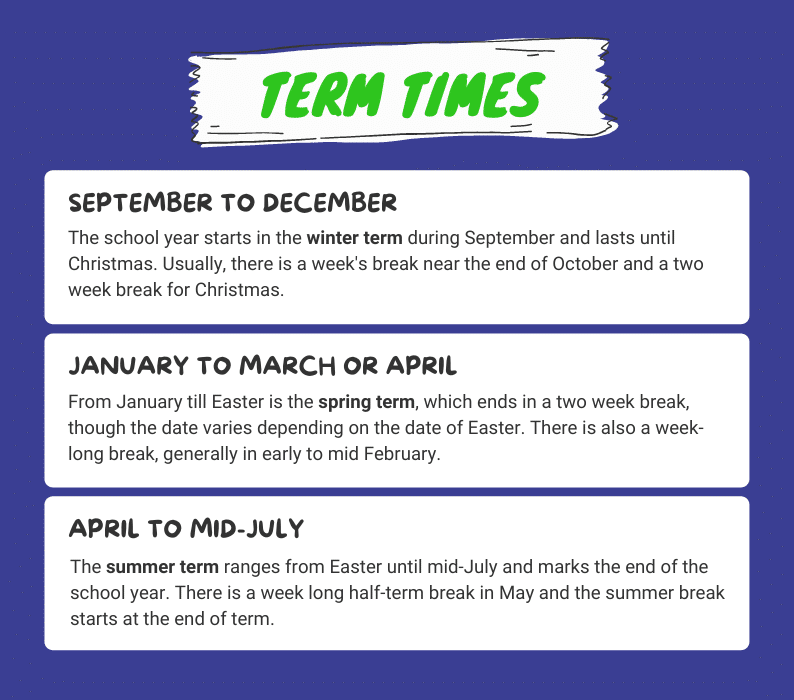
As a teaching assistant your starting salary is going to be around £15,000 but on average you could be earning around £19,000. Your skills and level of experience are going to be factors in what you earn and as you progress you could be seeing a salary of around £23,000.
If you want to learn more about what a teaching assistant earns then check out our teaching assistant salary page where you can find our breakdown!
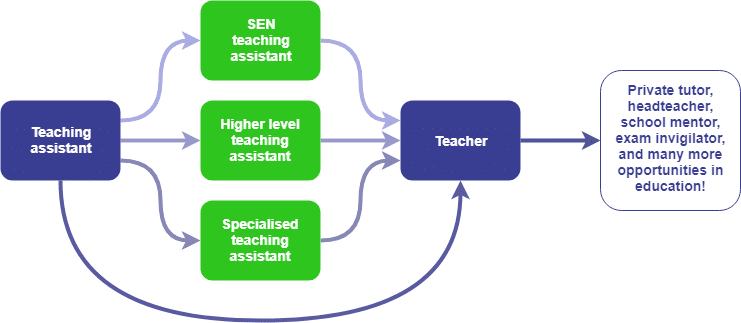
Teaching assistants have a number of progression options as they gain experience. You could become a SEN teaching assistant which means you’ll be working with children with special educational needs to best support them, or you might become a HLTA.
Higher level teaching assistants have higher level qualifications and handle more duties than a regular TA, such as lesson planning, covering teacher absences, marking work, and more.
If you want to progress even further then you could eventually look into becoming a fully qualified teacher. You’ll need to be qualified to degree level but becoming a teaching assistant is an excellent jumping off point for a career in education, since becoming a teaching assistant will give you crucial work experience in schools.
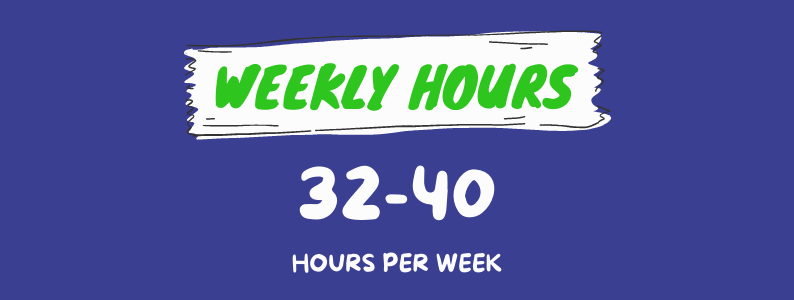
If you’re comfortable with the responsibilities of being a teaching assistant, then you’ll need to ensure that you have all of the necessary skills and teaching assistant qualifications for the position and understand what exactly you can do to help yourself get started in an educational setting.
You’ll need to meet the requirements for the job role you apply for, including any employer specific requirements. Pay attention to whether the job you’re applying for has any unique requirements compared to similar jobs and make sure you fulfil them before applying.
If you’re worried about your experience or qualifications, there are a few things that you can do to improve your chances of landing the job when you’re looking to enter a career as a TA.
Though schools often set their own requirements for teaching assistants depending on theirs and their pupils’ needs, it’s a good idea to get a Level 2 Teaching Assistant qualification so you’ll have the knowledge that you’ll need for the position, as well as looking good to prospective employers.
Once you have your Level 2 Teaching Assistant qualification, you could look at expanding your skillset with a Level 3 Teaching Assistant qualification. A Level 3 qualification will help you as you look to progress in your career. You’ll be able to build upon your knowledge and earn a higher salary
You could also need an A* to C grade at GCSE level in English and Maths or equivalent, depending on the workplaces you apply for, this is also a requirement for some teaching assistant apprenticeships and courses. If you don’t have either one or both of these you should look at taking either a Level 2 Functional Skills English course or Level 2 Functional Skills Maths course. A functional skills qualification is equivalent to having your GCSE qualification at this level, and can help you get into a wide range of jobs, not just in education.
Though not essential, having supporting qualifications can really improve your chances of getting the position that you want and help you to stand out among other applicants. Getting your supporting qualifications will let you demonstrate additional knowledge that other candidates might not have.
For a teaching assistant there are a number of supporting qualifications that could be helpful. A safeguarding and prevent course is going to equip you with the knowledge you need to help safeguard the children and young people you’ll be working with, which is a hugely important part of the job. Employers, as well as parents, are going to feel confident knowing you have the knowledge you need to support the organisation’s safeguarding responsibilities to a higher level.
As a teaching assistant it’s important that you have a first aid qualification in case of minor injuries that the children might end up with. Depending on the employer you might be given the option to receive this training before starting work but having the qualification beforehand can help put you ahead.
You could also look into a qualification in understanding autism. Having a greater understanding of autism and how it affects children could be very beneficial depending on the children you’ll be working with. Even if you’re not working in a specialised setting, having the knowledge is likely going to help in your position as autism affects 1 in 100 people in the UK, which could include some of the children you’re going to be working with.
Any experience working with children or in education will be invaluable to you when you’re looking at getting a position as a teaching assistant. This experience could range from anything from being a children’s sports coach or working as a nursery assistant.
Employers will look for transferable skills that will help you transition into working in a classroom setting. Where possible, get experience working with children who are of a similar age to those you would want to work with in a teaching assistant role. If you plan to work in a specialist area, or with children with special educational needs, try looking for relevant work or volunteering opportunities.
Contact the organisation directly if you are looking to volunteer in a school, nursery, college or any other educational setting. Volunteers are accepted in most educational organisations, but you will need to have a DBS check and be supervised in the initial stages of your placement. Checking out our jobs board is a great way to start searching for the experience you need!
You should make sure your CV includes your most up-to-date information, including any relevant qualifications and work experience you might’ve gained since you last updated it. It’s important to present yourself as best you can, since we all know first impressions are important, and your CV is more often than not going to be the first thing potential employers will see. It’s essential that they’re done right.
To make the best impression you can, you’ll need to convey the right information and present it well. Given how important your CV is, we’ve created a short guide to help give you the best chance of landing an interview and starting your career as a teaching assistant!
When you’re looking at a position as a teaching assistant, it’s crucial that your CV is high quality and reflects your passion for the role. An effective CV is well presented, displays relevant skills and experience, and gives your potential employers an insight into who you are.
It’s important that you use grammar correctly, that your writing is concise but informative, and any non-relevant information is left out. Not following these rules could mean your application is rejected, since employers could see it as too unprofessional. Read on for our top tips on structuring your teaching assistant CV and find out what exactly you should be including.
Your personal profile is the first section of your CV that employers will read to find out more about you. This is your chance to introduce yourself, sell your skills and outline your characteristics. Personal profiles are a perfect way to persuade recruiters, as it tells them straight off why they should hire you.
This section can include relevant experience and achievements, but it’s important to tailor this to the job description and what’s prioritised there to show your enthusiasm for the role and that you’re a serious candidate for the position who has what they’re looking for.
There are no set rules on the length of this section but you should aim for a few short sentences and no longer than 100 words. This way you can keep it concise and effectively highlight who you are to employers without giving them too much information, increasing the chances of them reading through the rest of your CV and considering you for the job. Make sure you’re putting your best foot forward and presenting the things that you think make yourself stand out.
Though your CV should be more focused on your skills and work experience rather than your personality, it can be good to include some relevant personal information such as your hobbies in your CV, but what counts as relevant will vary from job to job.
There should be a section in your CV that outlines your relevant skills. This makes it easy for the employer to read and more easily determine if you meet the requirements of the role. You should format this section using bullet points so that it’s simple and easy for employers to read. Make sure to include relevant skills that you think make you a good candidate for the position. Such as:
If you’re struggling to think of skills that are relevant to the job then it’s a good idea to check vacancy advertisements for some ideas. Start off by rereading the job you’re applying for and what might be useful to mention, but if you’re still stuck then take a look at other similar job postings. You should also think about which of your skills have been helpful in any of your past work or study.
It’s important when talking about your skills to try and include both hard and soft skills, so that you can show some variety. Hard skills are the skills you gain through experience, knowledge, or learning such as through a qualification or after undertaking training. Soft skills refer to your personal traits and habits that determine how you work, like being an effective communicator, able to work in a team, or organisational skills.
You should outline any past experiences in either work or volunteer positions that are relevant to becoming a forest school leader and can best show your potential employer the value that you’d be bringing to the position.
The most valuable experience you can have as an teaching assistant is working in either the same position before or as a nursery assistant. You should present this work experience front and centre if you have it.
Give details of where you worked, including the dates you started and finished your employment (these don’t have to be specific, usually the month and year are fine), alongside your key responsibilities within the role. If you have a lot of relevant experience then list it from most to least recent. Employers will want to know more of what you’ve been doing recently rather than years ago, as it’s more relevant to the jobs you’ll be applying for now.
If you have no relevant experience then you should include any previous employment you’ve been in and the transferable skills you gained that will be useful in the role. Try and think about any similarities between your previous positions and the one you’re applying for. Is there anything listed on the job advertisement that sounds familiar?
Making sure you mention your education clearly on your CV is very important, as it will show that you have the knowledge and qualifications needed for the job. When listing your qualifications you should prioritise two things: the level of the qualification (is it a degree or a GCSE?) and when you received it. Much like your experience, it’s best to list your qualifications from your most to least recent.
When you’re listing your qualifications make sure you include the name of the institution, the dates you attended them from, the subject(s) you studied or name of the qualification, as well as the final grade you received. If there’s a particular aspect of your study that is very relevant to the position you’re applying to then it would be a good idea to briefly mention it at some point.
Don’t think you just need to include your experiences from school or university, things like standalone courses that award you with a certificate or diploma are more than relevant, especially if they cover a subject that’s relevant to your work. Add your certificates in the same way you’d add your other qualifications, providing any additional information as needed.
If you’re uncertain about whether you have the right qualifications, make sure to look at our online teaching assistant courses. You can get the education you’ll need to enter into a new teaching assistant role, even if you don’t have any experience.
It might seem obvious, but having your contact details clearly signposted on your CV is extremely important, without them potential employers may have no way to contact you. You should include your up-to-date email, phone number, and address somewhere near the top of your CV so that they don’t get lost amongst the rest of your information.
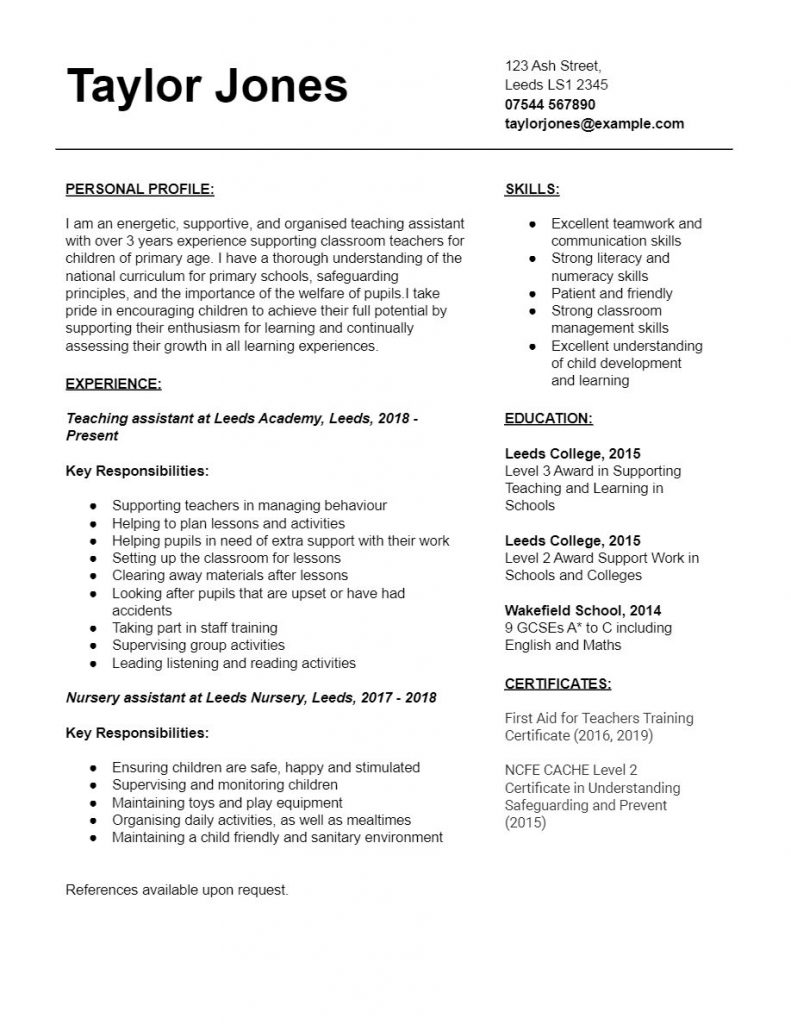
Struggling to put your CV together? Download our free teaching assistant CV template and get a head start on making a fantastic new CV. Make sure to follow the rest of our tips and learn how to land that job you’ve always wanted!
Searching for a teaching assistant position should be simple, and shouldn’t be any different from finding other jobs you’ve applied for before. Just make sure that the positions you apply for are a good fit for you and that you have all the necessary qualifications and you should have no trouble! Checking out our teaching assistant jobs across the UK is a great place to start your search.
You should write your cover letter using the job description of the vacancy you’re applying for. Your cover letter is an important part of many job applications.
No matter what kind of job you’re applying for, your cover letter is going to help demonstrate to potential employers the passion that you have for the role and allow you to sell yourself as a valuable candidate that they need to consider hiring.
Cover letters are your chance to really sell yourself to a prospective employer and progress to the next stage of the hiring process. This opportunity isn’t always fully exploited by candidates, and sometimes cover letters just become reworked CVs or are poorly planned and formatted.
The header of your cover letter should have your up-to-date email, contact number, and the current date, as well as the recipient’s contact information. You should start your cover letter with a greeting such as “Dear [Company] Hiring Manager” or “Dear Mr/Ms Surname”, if you know who you’ll be contacting directly.
When choosing your font you need to make sure it’s not only easy to read but also looks professional, as well as the right size. Try to stick between a size 10pt-12pt font on your cover letter, as making your font size too big could come across unprofessionally, but it should still be clear and legible. Make sure to split the main body of text into multiple paragraphs, this not only makes it easier to read but also easier to plan the structure of your cover letter (each paragraph might have a specific topic, for example).
It’s a good idea to sign off your cover letter using your name and a complimentary close. Using “Yours Sincerely” or “Your Faithfully” are seen as very formal, but can sometimes appear outdated, try using “Kind Regards” as a formal alternative that is still professionally acceptable.
Here are some suggestions for each of the paragraphs in your cover letter and what you might want to mention to your prospective employer:
We are interactive boxes, hover over us!
We are interactive boxes, tap us!
Introduction
Start by explaining why you're writing the letter, making sure to mention the job you're interested in by its specific title, you could also mention where you saw or heard about the vacancy. Give a brief sentence stating your experience or a relevant qualification.
Experience and Qualifications
Highlight your relevant experience or qualifications. Talk about relevant responsibilities you had in previous roles, and go into more detail about how this makes you suitable for the role--is there a particular achievement you're proud of in your previous work or study that is relevant to the job? Mention it here!
Skills
Discuss the skills you have that are relevant to the job and make sure that you mention how they make you well-suited for the role. Always be showing the employer what you have to offer them if they were to hire you.
Final note
Reiterate your interest in the role. Outline your motivations for not only working this type of job but why you want to work for this employer. It's a good idea to include some relevant knowledge about your potential employer, as it shows you are taking an extra interest.
A good way of making your cover letter stand out from other candidates is by tailoring it to the particular role you’re applying for. It’s always easiest to look back through the job posting and pick out relevant information like the job title and employer and making sure to mention them early on. This will show your employer that your cover letter is tailored towards them, rather than being something generic you’re sending around to every employer.
When you’re going through the job posting take note of the specific skills and experience listed as desirable by the employer, you can tailor the skills and experience you mention to what they’re looking for. Try not to follow along too closely and risk looking like you’ve just copied the advertisement, but do enough to show that you’re the ideal candidate.
Order your skills, experience, and qualifications in order of relevancy–what’s highlighted or mentioned first in the job posting? Is there something very specific that they’re looking for? Make sure you bring it up!
Now that your cover letter is well-formatted, has the main body of it’s content written, and has been tailored to the job role, it’s time to put the finishing touches to your work.
Proofread what you’ve written a few times over to check for punctuation or grammar errors and how well your writing flows. Try and enlist the help of a friend or relative to give it a read over, they may spot something you missed!
Now you should go back to the job vacancy and re-read all of it. Check if there are any special instructions you should follow when applying for the position, like if they’re asking for the documents to be submitted as a particular file type or maybe want you to add a job reference number to your cover letter.
Make any of the changes you need and ensure everything’s in order. Overlooking small things like this could ruin your otherwise perfect cover letter!
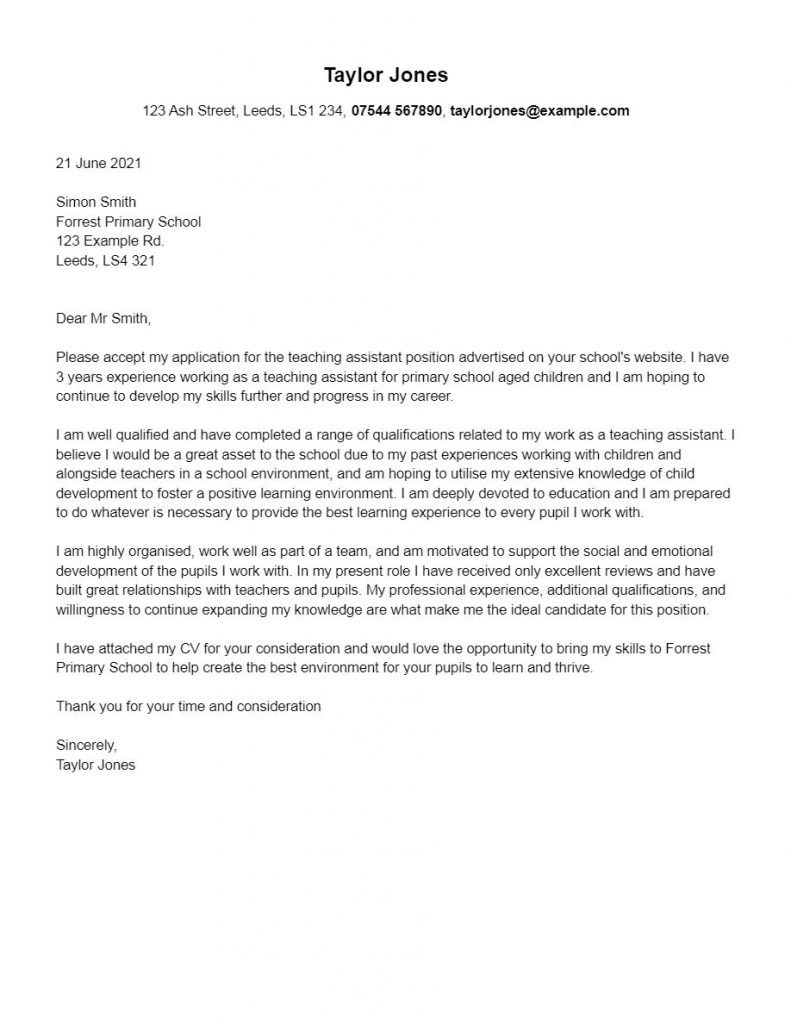
Struggling to put your cover letter together? Download our free cover letter template and get a head start on writing an amazing cover letter. Make sure to follow the rest of our tips and learn how to land that job you’ve always wanted!
We all know that job interviews can be nerve-wracking, but being well prepared for the interview will help you to appear calmer and more confident. It might seem obvious, but make sure that you always present yourself professionally at interviews, dress well, and always be polite. First impressions can make or break your chances!
Interviews can be daunting and hard to prepare for–especially if you don’t have much experience–but we’re here to help you out.
We’ve compiled a list of common questions that you might be asked in your interview for an early years job and how you should go about answering them, as well as some questions you can ask your interviewer to help show your interest in the position!
This is possibly one of the most common questions. The interviewer wants to see your motivations for wanting to become a teaching assistant. Be sure to show your passion and dedication for the job, and explain why you enjoy the profession. Refer to your own experiences which make the job rewarding for you.
Teaching assistant jobs are extremely fulfilling and rewarding. This question is asking you to discuss why you think it is a rewarding job. You could talk about how helping children thrive academically is extremely rewarding as you become their guide, supporting them in their educational needs and helping with their progression, but try to make your answer personalised. What about the job is rewarding for you?
This is a common question when applying for a job in any school and you should use this question as an opportunity to show the employer that you have taken the time to find out more about the school. Make sure to research the organisation beforehand and note down anything that really stands out to you so you that you can bring that knowledge into your interview.
Being able to talk about the school will show that you have a genuine interest in the job and help to get across your dedication to the position you’ve applied for. If you turn up not knowing anything about the school then it could make a bad impression, or at least not a great one.
This is another personal question, so in your response you should try to demonstrate your passion for the role and talk about what you really do enjoy about your work. You could also refer to specific situations in previous jobs if they had a particular impact on you and your enjoyment of the job.
This is a general question that the interviewer will use to gain an understanding of your idea of what a teaching assistant does day-to-day.
Use this as an opportunity to show them that you understand the role and that you would make a good candidate. Read the job listing to prepare for this question and see what responsibilities your potential employer is prioritising for the role.
If you already have experience in a teaching assistant role, going over your previous experience and what you would do in that role will help to further demonstrate your understanding. When answering questions like this with examples from your previous work or study try using the STAR method!
Teaching assistants play a valuable role in the classroom due to the support they give the teacher to ensure the pupils are excelling in class, as well as creating purposeful relationships.
You can talk about the positive impact of teaching assistants, how they support the progress of many children and the behaviour management skills that help to keep the classroom under control.
Display your understanding of the role and show that you know what is expected of you. Discuss some common situations you might expect to face as a teaching assistant, such as a child struggling with their work or misbehaving, and explain how you would approach it.
A school culture and ethos consists of the influences and attitudes within the school which affect everything that goes on inside the school. There are many possible responses here, all depending on how the school defines itself, so it would be good to read up on the school’s culture first.
You could talk about celebrating achievements and good behaviour, building values, encouraging innovation and setting consistent disciplinary measures, but your answer to this question could be entirely different based on the school so make sure you do your research.
This is a personal question which requires you to respond with a situation from your previous experience. Try and think of a good example If you have no past experience then you can talk about how you believe you will have a positive impact on children if you are given the opportunity.
The interviewer wants to know if you have the right skills to work in this role. Talk about your communication skills and try bring up any examples you think might be relevant. Have your communication skills helped you to accomplish a task at work before? Make sure you mention it!
Safeguarding questions are commonly asked to anyone working in education environment or with potentially vulnerable people. Doing a safeguarding course could be a good way of you getting additional knowledge in the area and getting the edge over other potential candidates. You’ll get all of the information you’ll need to be able to satisfy questions on safeguarding and your responsibilities.
This requires a simple answer as you are just talking about your own experiences. Not having any teaching assistant experience is okay, just talk about any past experience that you do have working with children or any work experience that might be relevant to the job.
This would be the ideal time to talk about any teaching assistant qualifications you have and what you learnt while doing these courses.
If you don’t have yours it could be a good idea to enrol on an online teaching assistant course before your interview. These courses can be completed in your free time and fit around your work so you can work while studying to get your qualification.
Any supporting qualifications that you have may also be good to mention. Qualifications in things like safeguarding and understanding autism are ideal for prospective teaching assistants.
Answering this question will likely be much easier for those with TA or childcare experience. Though it can certainly be answered well even if you don’t.
It doesn’t have to be a complicated issue or one where authorities were involved, it could be as simple as helping a lost child find there parents in the supermarket. An example out of the workplace may even be more valuable as it suggests you are always looking out for children, not only at work.
In this question the interviewer is looking for you to show genuine concern about the wellbeing of children. Try not to overthink or over-complicate your answer.
Learn about a teaching assistant’s role and responsibilities
Improve your chances of getting a position as a teaching assistant
Make sure your CV is up-to-date
Search for teaching assistant jobs you can apply for
Write a job-specific cover letter
Prepare for interviews
Learn about a teaching assistant’s role and responsibilities
Improve your chances of getting a position as a teaching assistant
Make sure your CV is up-to-date
Search for teaching assistant jobs you can apply for
Write a job-specific cover letter
Prepare for interviews
After reading through our guide, you should be ready to embark on a new career as a teaching assistant with the confidence you need to excel. If you follow our tips then you’ll be more than ready to get the job role you’ve been looking for! Good luck, and if you need any more advice on other career options, don’t forget to take a look through our career advice pages.
| Cookie | Duration | Description |
|---|---|---|
| cookielawinfo-checkbox-analytics | 11 months | This cookie is set by GDPR Cookie Consent plugin. The cookie is used to store the user consent for the cookies in the category "Analytics". |
| cookielawinfo-checkbox-functional | 11 months | The cookie is set by GDPR cookie consent to record the user consent for the cookies in the category "Functional". |
| cookielawinfo-checkbox-necessary | 11 months | This cookie is set by GDPR Cookie Consent plugin. The cookies is used to store the user consent for the cookies in the category "Necessary". |
| cookielawinfo-checkbox-others | 11 months | This cookie is set by GDPR Cookie Consent plugin. The cookie is used to store the user consent for the cookies in the category "Other. |
| cookielawinfo-checkbox-performance | 11 months | This cookie is set by GDPR Cookie Consent plugin. The cookie is used to store the user consent for the cookies in the category "Performance". |
| viewed_cookie_policy | 11 months | The cookie is set by the GDPR Cookie Consent plugin and is used to store whether or not user has consented to the use of cookies. It does not store any personal data. |